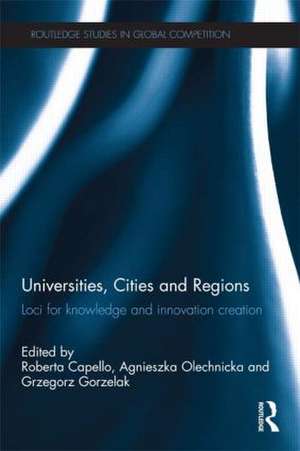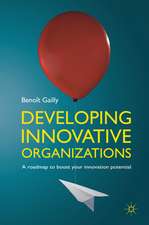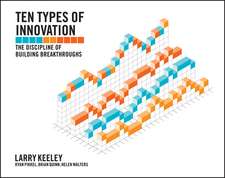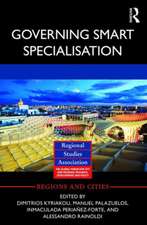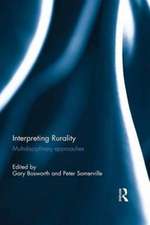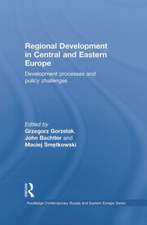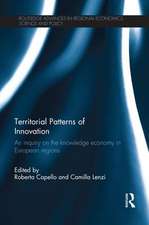Universities, Cities and Regions: Loci for Knowledge and Innovation Creation: Routledge Studies in Global Competition
Editat de Roberta Capello, Agnieszka Olechnicka, Grzegorz Gorzelaken Limba Engleză Paperback – 4 mar 2015
This book explains the logic behind these interactions and cooperative attitudes in regions and cities. One of the most significant channels comes from the presence of a university and its collaboration with firms and scientific research centres. These mutual relations between academic institutions and enterprises are of key importance.
The significance of universities in driving economic well being and regional development has been well documented for some time now. Much of the research, however, has centred upon countries in Western Europe and the United States. Increasingly, and since the expansion of the European Union in 2004 in particular, themes of academic entrepreneurship, university-business links, knowledge and innovation have become important on a Europe-wide scale. This book draws together key thinkers from across the continent to analyze the importance of higher educational institutions in fostering development.
| Toate formatele și edițiile | Preț | Express |
|---|---|---|
| Paperback (1) | 473.80 lei 6-8 săpt. | |
| Taylor & Francis – 4 mar 2015 | 473.80 lei 6-8 săpt. | |
| Hardback (1) | 1282.35 lei 6-8 săpt. | |
| Taylor & Francis – 6 noi 2012 | 1282.35 lei 6-8 săpt. |
Din seria Routledge Studies in Global Competition
-
 Preț: 327.10 lei
Preț: 327.10 lei -
 Preț: 420.76 lei
Preț: 420.76 lei - 18%
 Preț: 1056.80 lei
Preț: 1056.80 lei -
 Preț: 466.88 lei
Preț: 466.88 lei - 18%
 Preț: 1123.68 lei
Preț: 1123.68 lei - 16%
 Preț: 274.33 lei
Preț: 274.33 lei -
 Preț: 463.40 lei
Preț: 463.40 lei -
 Preț: 140.53 lei
Preț: 140.53 lei - 18%
 Preț: 1114.70 lei
Preț: 1114.70 lei -
 Preț: 462.85 lei
Preț: 462.85 lei - 25%
 Preț: 829.02 lei
Preț: 829.02 lei - 18%
 Preț: 1166.68 lei
Preț: 1166.68 lei - 18%
 Preț: 1066.09 lei
Preț: 1066.09 lei - 26%
 Preț: 850.37 lei
Preț: 850.37 lei - 18%
 Preț: 1109.99 lei
Preț: 1109.99 lei -
 Preț: 496.35 lei
Preț: 496.35 lei - 22%
 Preț: 297.62 lei
Preț: 297.62 lei - 18%
 Preț: 1282.35 lei
Preț: 1282.35 lei -
 Preț: 464.93 lei
Preț: 464.93 lei - 18%
 Preț: 1062.98 lei
Preț: 1062.98 lei - 12%
 Preț: 339.31 lei
Preț: 339.31 lei -
 Preț: 388.50 lei
Preț: 388.50 lei -
 Preț: 472.23 lei
Preț: 472.23 lei - 16%
 Preț: 248.97 lei
Preț: 248.97 lei -
 Preț: 472.23 lei
Preț: 472.23 lei - 34%
 Preț: 1185.83 lei
Preț: 1185.83 lei - 16%
 Preț: 129.96 lei
Preț: 129.96 lei - 18%
 Preț: 1162.39 lei
Preț: 1162.39 lei -
 Preț: 405.80 lei
Preț: 405.80 lei - 18%
 Preț: 1055.38 lei
Preț: 1055.38 lei - 25%
 Preț: 826.86 lei
Preț: 826.86 lei -
 Preț: 447.51 lei
Preț: 447.51 lei - 18%
 Preț: 1064.01 lei
Preț: 1064.01 lei - 25%
 Preț: 527.96 lei
Preț: 527.96 lei - 18%
 Preț: 1052.35 lei
Preț: 1052.35 lei - 18%
 Preț: 1172.50 lei
Preț: 1172.50 lei - 18%
 Preț: 718.40 lei
Preț: 718.40 lei - 25%
 Preț: 557.95 lei
Preț: 557.95 lei - 26%
 Preț: 820.40 lei
Preț: 820.40 lei -
 Preț: 467.44 lei
Preț: 467.44 lei - 34%
 Preț: 988.54 lei
Preț: 988.54 lei - 18%
 Preț: 1168.76 lei
Preț: 1168.76 lei - 18%
 Preț: 1056.00 lei
Preț: 1056.00 lei
Preț: 473.80 lei
Nou
Puncte Express: 711
Preț estimativ în valută:
90.66€ • 94.90$ • 75.46£
90.66€ • 94.90$ • 75.46£
Carte tipărită la comandă
Livrare economică 31 martie-14 aprilie
Preluare comenzi: 021 569.72.76
Specificații
ISBN-13: 9781138903753
ISBN-10: 1138903752
Pagini: 400
Ilustrații: 34 black & white illustrations, 24 black & white tables, 34 black & white line drawings
Dimensiuni: 156 x 234 x 21 mm
Greutate: 0.56 kg
Ediția:1
Editura: Taylor & Francis
Colecția Routledge
Seria Routledge Studies in Global Competition
Locul publicării:Oxford, United Kingdom
ISBN-10: 1138903752
Pagini: 400
Ilustrații: 34 black & white illustrations, 24 black & white tables, 34 black & white line drawings
Dimensiuni: 156 x 234 x 21 mm
Greutate: 0.56 kg
Ediția:1
Editura: Taylor & Francis
Colecția Routledge
Seria Routledge Studies in Global Competition
Locul publicării:Oxford, United Kingdom
Public țintă
PostgraduateCuprins
Preface: Knowledge and Innovation Challenge Stavros A. Zenios Introduction: Cities, Regions and Universities as Knowledge and Innovation Creators Roberta Capello, Agnieszka Olechnicka and Grzegorz Gorzelak Part I: Universities: Local/Regional Institutions Of Knowledge Creation And Innovation In National And International Contexts 1. Science-based Activities in European Regions: The Knowledge-Innovation Nexus Roberta Capello 2. The Civic University: Connecting the Global and the Local John Goddard, Paul Vallance and Louise Kempton 3. The Innovation Process of European Regions: From Absorption to Knowledge Creation Capacities of European Regions Malgorzata Runiewicz-Wardyn 4. Universities as Knowledge Nodes in Open Innovation Systems Suntje Schmidt 5. Regional Cooperation or External Links? Spatial Proximity in Science-Business Relations in Poland Agnieszka Olechnicka 6. ‘What do You Offer?’: Interlinkages of Universities and High-Technology Companies in Science and Technology Parks in Berlin and Seville Sascha Brinkhoff, Lech Suwala and Elmar Kulke 7. Relations Between International Research Collaboration, Scientific Production and the Impact of Research at Polish Universities Krzysztof Klincewicz Part II: Universities, Entrepreneurship and Innovation-driven Development 8. The Research University, Entrepreneurship and Regional Development: Research Propositions and Current Evidence Helen Lawton Smith and Sharmistha Bagchi-Sen 9. The Second Coming of the Triple Helix and the Emergence of Hybrid Innovation Environments Martin Meyer, Kevin Grant and Jari Kuusisto 10. Bringing University Knowledge to Market: Experience in The Netherlands Marina Van Geenhuizen 11. Academic Entrepreneurs in Post-Socialist Central European Countries: Evidence from the Hungarian Biotechnology Sector Katalin Erdõs and Attila Varga 12. Universities, Researchers and Their Perspective on the Fulfilment of the Third Role: The Case of Czechia Pavla Žížalová, Vladislav Čadil 13. ‘Entrepreneurial Universities, Entrepreneurial Students’. Higher Education and Creation of Innovation in the Spanish Area Ana Lanero, José Luis Vázquez and María Purificación García 14. The Role of University Medical Centres in an Innovation Network Dennis Häckl, Hans Wiesmeth, Oliver Fiala Part III: Academic Footsteps In The City 15. The ‘Adaptive University’: Responding to New Expectations and Coping with Established Tasks Jan Sadlak 16. Absorption of Human Capital by Academic Cities in Poland Mikołaj Herbst 17. The Innovative Potential of Kyiv: Overestimated and Underused Olga Mrinska 18. University and Regional Development in the Northern European Peripheries: The Case of the University of Tromsø Kazimierz Musiał
Notă biografică
Roberta Capello is Full Professor of Regional Economics at the Polytechnic University of Milan, Italy.
Agnieszka Olechnicka is Assistant Professor at the Centre for European Regional and Local Studies at the University of Warsaw, Poland.Grzegorz Gorzelak is Professor and Director of the Centre for European Regional and Local Studies at the University of Warsaw, Poland.
Agnieszka Olechnicka is Assistant Professor at the Centre for European Regional and Local Studies at the University of Warsaw, Poland.Grzegorz Gorzelak is Professor and Director of the Centre for European Regional and Local Studies at the University of Warsaw, Poland.
Descriere
Increasingly, and since the expansion of the European Union in 2004 in particular, themes of academic entrepreneurship, university-business links, knowledge and innovation have become important on a Europe-wide scale. This book draws together key thinkers from across the continent to analyze the importance of higher educational institutions in fostering development.
